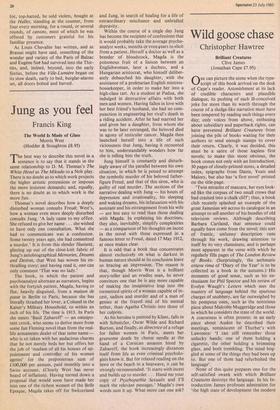Jung as you feel
Francis King
The World Is Made of Glass Morris West (Hodder & Stoughton £8.95)
The best way to describe this novel in a sentence is to say that it stands in the same relationship to D. M. Thomas's The White Hotel as The Mikado to a Noh play. There is no doubt as to which work projects the higher artistic pretensions or imposes the more insistent demands; and, equally, there is no doubt as to which work is the more fun.
Thomas's novel describes how a deeply disturbed woman consults Freud; West's, how a woman even more deeply disturbed consults Jung. 'A lady came to my office. She refused to give her name ... she wished to have only one consultation. What she had to communicate was a confession. Some twenty years ago, she had committed a murder.' It is from this slender filament, glinting up out of the close-knit fabric of Jung's autobiographical Memories, Dreams and Desires, that West has woven his en- thralling story; and having read it, one can only comment 'That was no lady.'
The book, in which the patient and psychoanalyst alternate as narrators, begins with the fortyish patient, Magda, having to flee, heavily disguised, from a maison de passe in Berlin to Paris, because she has literally thrashed her lover, a Colonel in the Kaiser's Military Household, to within an inch of his life. The time is 1913. In Paris she meets 'Basil Zaharoff' — an omnipo- tent crook, who seems to derive more from some Ian Fleming novel than from the real- life armaments dealer of that same name who is so taken with her audacious charms that he not merely beds her but offers her the job of 'madam of all his houses of ap- pointment and controller of his women agents' for the preposterous sum of £100,000 per annum, paid monthly into a Swiss account. (Clearly West has never heard of inflation). Having turned down a proposal that would soon have made her into one of the richest women of the Belle Epoque, Magda takes off for Switzerland
and Jung, in search of healing for a life of extraordinary mischance and unbridled depravity.
Within the course of a single day Jung has become the recipient of confessions that it would probably take the average psycho- analyst weeks, months or even 'tears to elicit from a patient. Herself a doctor as well as a breeder of bloodstock, Magda is the poisonous fruit of a liaison between an Englishwoman, later a duchess, and a Hungarian aristocrat, who himself deliber- ately debauched his daughter, with the assistance of a proletarian English mistress- housekeeper, in order to make her into a high-class tart. As a student at Padua, she indulged in destructive affairs with both men and women. Having fallen in love with her best friend's husband, she had no com- punction in engineering her rival's death in a riding accident. After he had married her and given her a daughter, from whom she was to be later estranged, the beloved died in agony of testicular cancer. Magda then launched herself into a life of such viciousness that Jung, having it recounted to him, understandably wonders how far she is telling him the truth.
Jung himself is constantly and disturb- ingly aware of the parallel between his own situation, in which he is poised to attempt the symbolic murder of his beloved father- figure Freud, and that of this siren, who is guilty of real murder. The sections of the narrative dealing with Jung — his bouts of depression and irrationality, his sleeping and waking dreams, his infatuation with his assistant and his estrangement from his wife — are less easy to read than those dealing with Magda. In explaining his doctrines, they also, inevitably, simplify complexities — as a comparison of his thoughts on incest in the novel with those expressed in a famous letter to Freud, dated 17 May 1912, at once makes clear.
It is odd that a book that concentrates almost exclusively on what is darkest in human nature should at its conclusion leave so bracing an impression. The reason is that, though Morris West is a brilliant story-teller and an erudite man, he never convinces one that he is any more capable of making the imaginative leap into the tormented spirits of a woman capable of in- cest, sadism and murder and of a man of genius at the frayed end of his mental tether, than Agatha Christie into those of her culprits.
As his heroine is painted by Klimt, falls in with Schnitzler, Oscar Wilde and Richard Burton, and finally, as directrice of a refuge for fallen women in Paris, meets her gruesome death by cheese needle at the hand of a Corsican assassin hired by Zaharoff, the book increasingly distances itself from life as even criminal psycholo- gists know it. But for relaxed reading on the lawn or the beach in a heatwave, it can be strongly recommended. 'It starts with incest and builds up to murder ... Hand me your copy of Psychopathia Sexualis and I'll mark the relevant passages.' Magda's own words sum it up. What more can one ask?






































 Previous page
Previous page